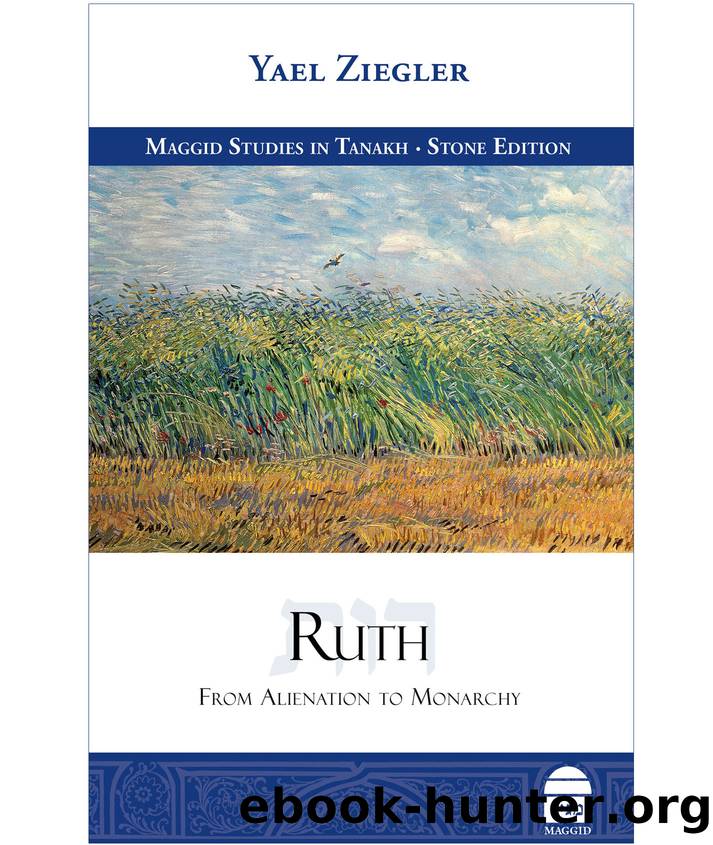Ruth: From Alienation to Monarchy by Ziegler Yael

Author:Ziegler, Yael [Ziegler, Yael]
Language: eng
Format: epub
Publisher: The Toby Press
Published: 2015-02-06T16:00:00+00:00
1.
This verb is often used to refer to comfort for the bereaved (e.g., Gen. 38:12; II Sam. 13:39). That does not seem likely in this context. At no point in the narrative does Ruth mention her deceased husband, Maĥlon.
2.
See also Hosea 2:16.
3.
Interestingly, both of these phrases also appear in the story of the concubine and the civil war (Judges 19:3; 21:6, 15). While the phrases are not juxtaposed there, the fact that they both occur in that narrative creates yet another parallel between the two narratives.
4.
Unlike Isaiah 1–39, which focuses on destruction and punishment, Isaiah 40–66 focuses on salvation. See Rashi, Is. 40:1.
5.
This is yet another example of the modus operandi of the midrash, with its exceptional sensitivity to literary parallels. Nevertheless, the midrash does not explicitly refer to this parallel (or to the verse in Isaiah) and assumes that the reader will understand what motivated this astute comparison.
6.
See also Pesikta DeRav Kahana 16; Yalkut Shimoni II :443.
7.
Geula is a central goal (and a key word) of the book. While Boaz will act as the goel in a narrow context (for the family of Naomi), he will ultimately produce the Davidic dynasty that provides geula for the nation. We will discuss this at greater length in our examination of chapters 3 and 4.
8.
The Greek translation simplifies matters by omitting the negative, rendering the phrase: “I will become one of your maidservants.” I have adopted the interpretation of both Rashi and Ibn Ezra. In this reading, the irony of Ruth’s words cannot be ignored; Ruth, who declares that she is not even worthy of becoming Boaz’s maidservant, will not be Boaz’s maidservant, she will be his wife. A midrash observes this irony, and places in Boaz’s mouth the following response to Ruth’s words (Pesikta DeRav Kahana 16): “[Boaz] said to her, ‘You should not speak thus. God forbid that you will be counted as one of the maidservants (amahot ); rather, you shall be counted as one of the matriarchs (imahot )!” See also Ruth Rabba 5:5. The midrash bases this reading on the omission of the dot in the letter heh of the word la , meaning “to her.” Because this omission only occurs three times in all of Tanakh (Num. 32:42; Zach. 5:11 – see Tosafot , Kiddushin 49b), the midrash interpets the word la as having the meaning lo . Thus, instead of reading the verse as “And Boaz spoke to her,” the midrash reads, “And Boaz said, ‘No!’” See Eitz Yosef ’s commentary on Ruth Rabba 5:5.
9.
Scholars have debated whether the term ama (used by Ruth in 3:9) indicates a woman with a socially higher position than a shifĥa . See, e.g., Sasson, Ruth , 53–54. The evidence does not necessarily bear out this distinction, as may be seen from the interchangeable use of these terms in most cases in Tanakh (e.g., II Sam. 14:15–17). For a notable exception in which the usage of these terms may indicate that there is a significant difference between them, see I Sam.
Download
This site does not store any files on its server. We only index and link to content provided by other sites. Please contact the content providers to delete copyright contents if any and email us, we'll remove relevant links or contents immediately.
| Hebrew Bible (Old Testament) | Talmud |
| Torah | Zohar |
The Power of Habit by Charles Duhigg(3118)
Man's Search for Meaning by Viktor E. Frankl(2663)
Mckeown, Greg - Essentialism: The Disciplined Pursuit of Less by Mckeown Greg(2413)
MOSES THE EGYPTIAN by Jan Assmann(2410)
Devil, The by Almond Philip C(2322)
The Complete Dead Sea Scrolls in English (7th Edition) (Penguin Classics) by Geza Vermes(2269)
Unbound by Arlene Stein(2267)
I Capture the Castle by Dodie Smith(2029)
Schindler's Ark by Thomas Keneally(1872)
The Invisible Wall by Harry Bernstein(1797)
The Gnostic Gospel of St. Thomas by Tau Malachi(1779)
The Bible Doesn't Say That by Dr. Joel M. Hoffman(1674)
The Secret Doctrine of the Kabbalah by Leonora Leet(1600)
Political Theology by Carl Schmitt(1569)
The Jewish State by Theodor Herzl(1526)
A History of the Jews by Max I. Dimont(1518)
The Dead Sea Scrolls Bible by Martin G. Abegg(1500)
The Book of Separation by Tova Mirvis(1479)
Oy!: The Ultimate Book of Jewish Jokes by David Minkoff(1360)
